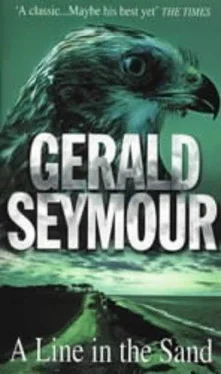Gerald Seymour - A Line in the Sand
Здесь есть возможность читать онлайн «Gerald Seymour - A Line in the Sand» весь текст электронной книги совершенно бесплатно (целиком полную версию без сокращений). В некоторых случаях можно слушать аудио, скачать через торрент в формате fb2 и присутствует краткое содержание. Жанр: Триллер, на английском языке. Описание произведения, (предисловие) а так же отзывы посетителей доступны на портале библиотеки ЛибКат.
- Название:A Line in the Sand
- Автор:
- Жанр:
- Год:неизвестен
- ISBN:нет данных
- Рейтинг книги:3 / 5. Голосов: 1
-
Избранное:Добавить в избранное
- Отзывы:
-
Ваша оценка:
- 60
- 1
- 2
- 3
- 4
- 5
A Line in the Sand: краткое содержание, описание и аннотация
Предлагаем к чтению аннотацию, описание, краткое содержание или предисловие (зависит от того, что написал сам автор книги «A Line in the Sand»). Если вы не нашли необходимую информацию о книге — напишите в комментариях, мы постараемся отыскать её.
A Line in the Sand — читать онлайн бесплатно полную книгу (весь текст) целиком
Ниже представлен текст книги, разбитый по страницам. Система сохранения места последней прочитанной страницы, позволяет с удобством читать онлайн бесплатно книгу «A Line in the Sand», без необходимости каждый раз заново искать на чём Вы остановились. Поставьте закладку, и сможете в любой момент перейти на страницу, на которой закончили чтение.
Интервал:
Закладка:
"It is natural that a man would wish to be killed seventy times and still come back to life to be killed all over again… He stood naked. What he would wear that night was laid out on the tidied bunk bed. When the revolution had come, when the tanks were on the streets, and the rule of the Shah was in its death throes, he had dropped out of school. Going forward with the Molotovs, running across open streets to retrieve those shot by the soldiers, he had been noticed. He had felt no fear and it was seen. When the Imam Khomeini at last came home he was, at seventeen years old, given a Kalashnikov rifle and drafted into a south Tehran komiteh. He had been on the roof of the Alawi Girls' School when the last chief of the SAVAK was half hanged, cut down, beaten so that his leg bones splintered, mutilated with knives, lit by television lights, killed, and he had felt no pity. He had been inducted into the pasdars, joined with pride the unit of the Revolutionary Guard Corps that safeguarded the Imam at his simple home in Jamaran. He had gone into the embassy of the Great Satan, into the Den of Spies, into the rooms where the shredders had failed and the files on collaborators and traitors were to be found, and he had hunted them. The war had come. The military could not be trusted. The war with Iraq was his transient route from teenager to man. He had become an elusive, skilled master of the flooded death ground that was the Faw peninsula and the Haural-Hawizeh marshland. He had come home, his first leave in two years, to find the dried heap of rubble with the small tunnel through which the bodies of his parents had been extracted. After praying at their grave in the Behesht-e-Zahra cemetery, he had taken the next bus back to the front line.
The Scuds were fired with American help. American satellite photography was passed to the Saudis, who forwarded the images to Baghdad. The hatred grew. When the war was over and the Imam had sued for peace and had spoken of taking a decision more deadly to him than drinking hemlock, when he had come home, he had been taken under the wing of a brigadier in the Ministry of Information and Security, as if by a foster-parent. And his talents were let loose, and killings followed in his footprints. From what he had seen, suffered, experienced, survived, there was no place in his mind for fear.
"This is the perception which creates the desire for martyrdom among Muslims…"
He began to cover his nakedness. He wriggled into ankle-length thermal under-trousers, then a thermal vest. He struggled into the rubber suit. He had worn such suits in the probing fast craft they had used in the swamps of the Faw peninsula, and he had been in such a suit when he had first gone ashore on the coast of the Eastern Province of Saudi Arabia. He put his watch back on his wrist. Later, he would synchronize the time on it with the time on the master's watch. Later, the master would send a radio message of seeming innocence to his employer, the National Iranian Tanker Corporation, in Tehran, and his watch would be synchronized with a clock at the NITC, and the clock there with the master clock in the room at the Ministry of Information and Security where the brigadier waited. Later, the master clock would be synchronized on a secure voice-link with the embassy in London. Finally, the intelligence officer at the embassy would synchronize his watch with that of the courier on the shore… Everything was planned to the smallest detail, as always. He waited for the master to come to take him to the stern deck. On his bare feet, below where the wet suit sealed his ankles, he slipped a pair of casual trainer shoes. He waited for the master and thought of his wife, Barzin, and their small home, and he wondered whether she missed him. They had no children perhaps it was his fault and perhaps it was hers but the doctors they visited would not tell them. She asked nothing of him except that he should serve the revolution of the Imam. The tanker churned its way north up the Channel. He took comfort again from the words of the ayatollah from the college at Qom. He was Vahid Hossein. He was the Anvil.
It was a pretext, but the first and there would be more.
The rain, as promised, had come on harder. Davies sat in the car. He didn't need to wind down the window and let in the damp air. He had the monitor screen on the floor in front of the empty passenger seat, and the headset over his ears. Two cables led from the car to a small junction box screwed to a side wall of the house. He was parked right up against the wall, filling the alley. He could see, in black and white, on his screen, the neighbour on the front doorstep, and hear distorted speech from the button microphone secreted in the porch.
The pretext seemed innocent enough.
"Sorry, Frank, for disturbing you. You got a Philips screwdriver? Can't seem to find one anywhere."
"Sure, Jerry, won't take me a minute."
"Everything all right?"
"Everything's fine. Just wait there, I'll get it."
He saw the neighbour's grimace. He'd have expected to be invited inside, but the principal had learned fast and left him at the door. The neighbour's eye line roved over the front of the house and checked the cables, the broken plants where the ladder had been, and looked into the camera. He wouldn't have seen the button microphone because the men from London were skilled in positioning them had to be because not even the principal knew about the audio surveillance. People didn't mind outside cameras but they were generally difficult about microphones. He could hear, adequately, anything said in the front of the house, ground floor, and on the stairs; it was good technology and necessary.
"There we go, one Philips screwdriver."
"Brilliant."
"No hurry for it back."
"Great. Frank, Mary said you had a new alarm system fitted today."
"Yes."
"Something I don't know?"
"I doubt it, Jerry."
"Don't think me inquisitive, Frank, not me, but there hasn't been a burglary this end of the village in four years, not since the Doves' place. Mary said you'd put in the full works, chaps like chimps running up ladders. Friend to friend, what do you know that I don't, eh?"
"Just taking sensible precautions, Jerry. You're getting soaked."
"Frank, no pissing, who's that joker in the car?"
"I'm right in the middle of a bit of work. Bring it back when you've finished with it, no hurry."
The door closed and the neighbour retreated. He'd have been sent by his wife, neighbours always were. He'd report that he hadn't really learned anything. That wouldn't satisfy the wife, and she'd be round in the morning to beg a half-pint of milk or borrow a half-pound of flour. And they'd fret through the evening, the neighbour and his wife, about the cables and the camera, and whether a wave of thieving was about to strike their small corner of heaven.
The boy came home, and the woman who drove him gave Davies a grinding glance before she pulled away. He doubted this little place could survive without knowing every soul's business. His lunch-box was finished, except for the apple he always kept till last. It would be another hour before Leo Blake turned up to do the night shift. He polished the apple on his sleeve and listened. He'd made his suggestion, how they should tell the boy. They might have been at the bottom of the stairs or just inside the kitchen. His mother did it. There were faint voices.
Frank used to work for the government abroad. He'd made some enemies. He did secret work, and it was still secret, and Mummy's secret and Stephen's. Frank's going to be protected by the police just for a few days… "Are we going to have to go? Will we have to leave here?"
"No." Her clear voice.
"There's nothing to worry about we aren't leaving our home."
Davies put the apple core in his lunch-box.
Читать дальшеИнтервал:
Закладка:
Похожие книги на «A Line in the Sand»
Представляем Вашему вниманию похожие книги на «A Line in the Sand» списком для выбора. Мы отобрали схожую по названию и смыслу литературу в надежде предоставить читателям больше вариантов отыскать новые, интересные, ещё непрочитанные произведения.
Обсуждение, отзывы о книге «A Line in the Sand» и просто собственные мнения читателей. Оставьте ваши комментарии, напишите, что Вы думаете о произведении, его смысле или главных героях. Укажите что конкретно понравилось, а что нет, и почему Вы так считаете.












